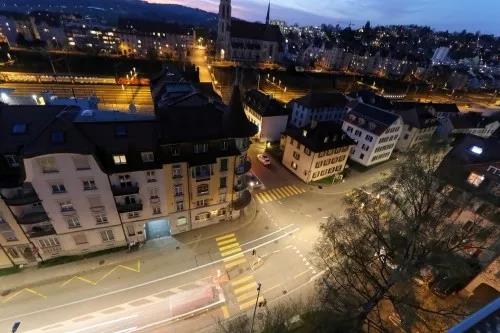Osram and wireless sensor network technology company Paraox Engineering SA have jointly launched an outdoor intelligent lighting pilot project in St. Gallen, northeastern Switzerland. It is expected to install LED lighting devices and remote control systems in the city.
In cooperation with the utility and public works company St. Gallen Stadtwerke, OSRAM offers 60 SL20 LED lighting units, which were first tested on the local Oberstrasse. This LED lighting system, combined with the Paradox Engineering wireless network, provides remote monitoring via its PE Smart Urban Network platform. After installation, St. Gallen Stadtwerke can manage all fixtures in the pilot area from a web-based console. Operators can adjust single or multiple LED street lights, centrally control urban lighting by time and sub-area, and track street lights at any time.
Paradox Engineering has advanced R&D capabilities and marketing experience in RF and ultra-low power design and network design, network construction and management. It is reported that OSRAM and Paradox have been working together for many years, which will enable OSRAM to have the opportunity to turn public lighting infrastructure into a smart city network to support and manage multiple city services.
At the same time, the sensors integrated in the luminaire can be controlled autonomously. According to the road traffic congestion, the street lights will automatically adjust the light and darkness. If there are no vehicles and pedestrians at night, the lights can be dimmed to reduce energy consumption. This system saves 65% of electricity consumption compared to traditional street lights.

Urs Etter, head of public lighting at St. Gallen Stadtwerke, said: “The streetlights have a direct impact on the city's attractiveness, so we are looking for the best possible between saving energy, reducing emissions and saving money, and ensuring quality of life and public safety. Balance. In recent years, we have been investing in LED systems, and we are proud to adopt this dynamic intelligent lighting solution, which will further enhance our sustainability performance."
Back in technology, Paradox connects to SSL products based on open standards, and the company is a pioneer in smart city applications. Companies typically rely on the IEEE 802.15.4 wireless physical layer (PHY), which is widely used in IoT applications, and is the PHY specified in the ZigBee standard. But Paradox uses Internet Protocol (IP)—especially IPv6-based 6LoWPAN (through a low-power wireless personal area network) to send control commands and retrieve operational data. Paradox supports intelligent lighting, smart parking, smart meters, smart waste handling systems and electric vehicle charging pile management as well as security surveillance IP cameras, traffic flow monitoring, public Wi-Fi hotspots and other urban applications.
The system was piloted in St. Gallen and will likely be used in other smart cities in the future.

Advertising EV Charging Stations
Advertising EV Charging Stations, China Ev Charging Pile,Advertising Charging Station supplier & manufacturer, offer low price, high quality Advertising Charging Pile,Advertising Charging Pile, etc.
Advertising EV Charging Stations
Shenzhen Hongjiali New Energy Co., Ltd. , https://www.hjlcharger.com